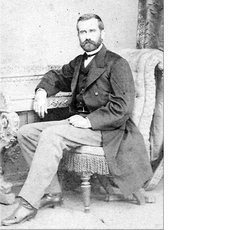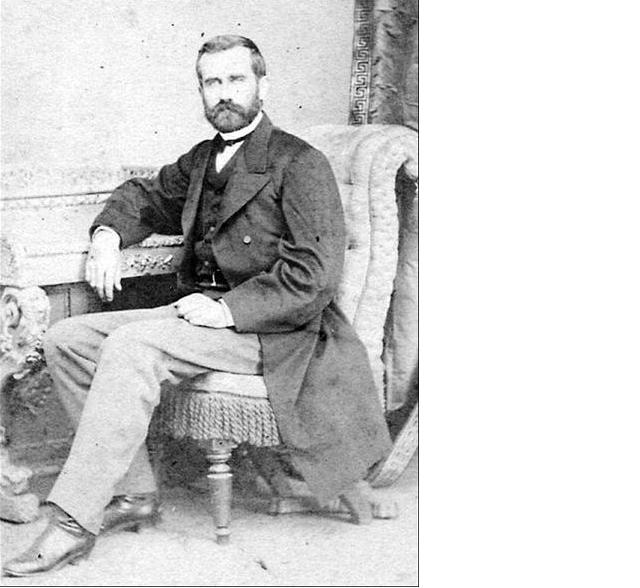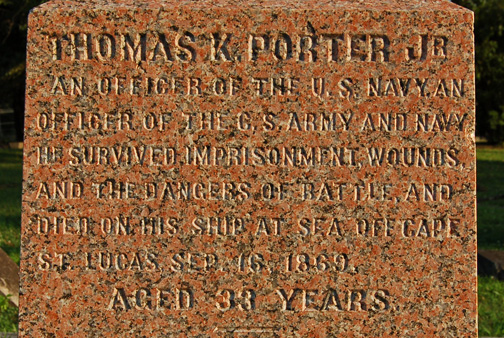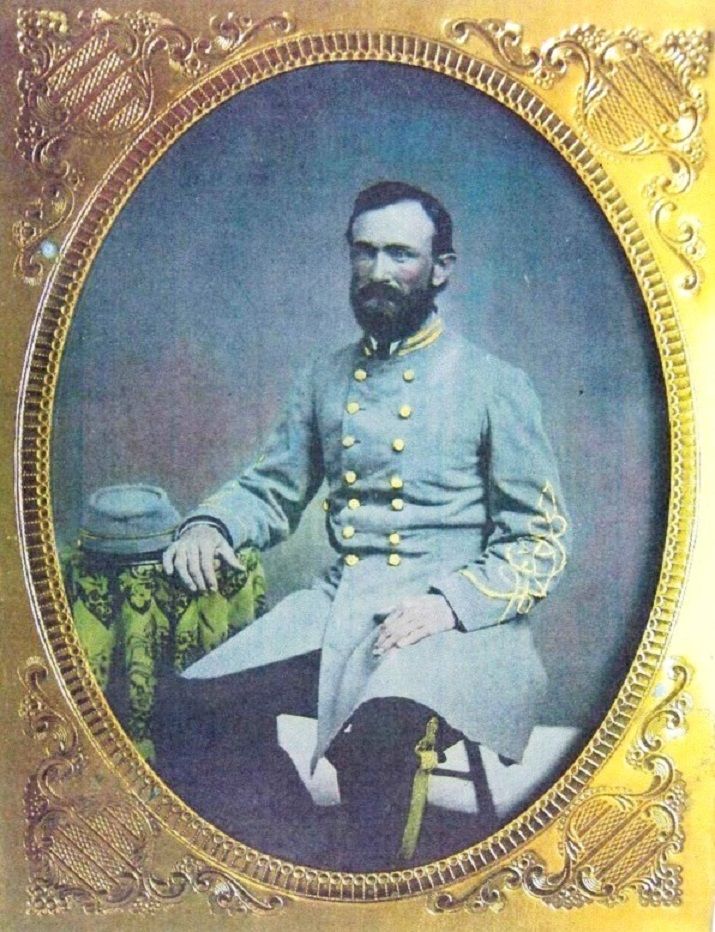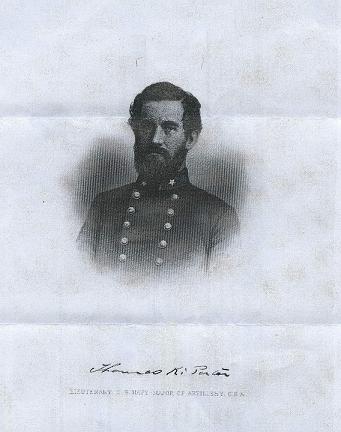(Bio by Don Watkins) Born to Dr. Thomas Kennedy Porter Sr. of Paris, Henry County, Tennessee "Kenny" as he was called, graduated from the United States Naval Academy at Annapolis, Maryland in 1856. In 1861 he was elected Captain of Porter's Battery, a Confederate Light Artillery Battery. He died at sea of the coast of what is now Cabo San Lucas in the Mexican State of Baja California Sur in 1869. He is buried in the Paris City Cemetery, Paris, Henry County, Tennessee.
(special thanks to PPC for the following info) The article below, taken from an Knoxville, TN newspaper, published in 1870, seems to be just a bit different from what someone wrote earlier.
The remains of Capt. Thomas K. Porter of Henry County, who was killed in the Confederate Army during the war, have been disinterred and taken to Paris, Tenn., for reinterrment. (Taken from the Knoxville Daily Whig, published on 25 Feb 1870.)
(special thanks to Ira Scott for the following info) The following article was written by the late W. Bryant Williams. It appeared in the October/December 1990 issue of The Color-Bearer.
Thomas Kennedy Porter - While most Henry Countians are aware that our county furnished three governors of the State of Tennessee, one of them James D. Porter, not many know that Gov. Porter had a younger brother who had a distinguished military career, both in the United States Navy and in the Confederate Army of Tennessee, and later in the Confederate Navy.
Thomas Kennedy Porter was the sixth child of Thomas Kennedy and Geraldine (Horton) Porter. The father of the Porter clan, Thomas Kennedy Porter Sr., was born in Kentucky. He graduated from Transylvania College and became a doctor. He settled in Paris in 1823 and had nine children. His third child was Gov. Porter. His sixth child, Lt. Thomas Kennedy Porter, a graduate of the United States Naval Academy, resigned from the United States Navy in 1861 to serve the Confederacy, and was appointed to the same rank in the Confederate Navy, but accepted the command of a company of field artillery tendered him by the then-governor of Tennessee, Isham Greene Harris, with the army equivalent rank of captain.
Capt. Porter's Tennessee Light Artillery was organized July 1, 1861, as State troops, and mustered into Confederate service on Sept. 30, 1861, at Nashville. On Oct. 28, 1861, in the organization of the Army Corps of Central Kentucky, it was placed in Brig. Gen. Simon B. Buckner's Division at Bowling Green, Ky. On Feb. 6, 1862. Porter's Battery was ordered to report to Gen. John B. Floyd at Fort Donelson, where one of the most important battles of the Civil War was soon to be fought. The morning of Feb. 14 dawned cold and quiet. Early in the afternoon the stillness was broken by a furious roar. Union gunboats on the Cumberland River had silenced Fort Henry and begun their attack on Donelson. The 11 big guns in the fort inflicted heavy damage on the gunboats, however, and they were forced to retreat. The hills and hollows echoed with cheers from the Southern soldiers. But their rejoicing was short-lived as the Confederate Gens. Buckner, Floyd, Gideon Pillow and Bushrod Johnson realized that Gen. Ulysses S. Grant was receiving reinforcements daily and had extended his right flank almost to Lick Creek to complete encirclement of the Southerners.The generals massed their troops against the Union right, hoping to clear a route to Nashville and safety. The battle on Feb. 15 raged all morning, the Union army grudgingly retreating step by step. But Grant launched a vigorous counter attack, retaking most of the lost ground and the way of escape was closed once more. Floyd, in his report of the Federal attack on Feb. 15, said: "Too high a praise cannot be bestowed upon the battery of Captain Porter for its participation in the rout of the enemy in this assault."Buckner also reported: "I cannot bestow sufficient praise on Captains Porter and Graves for the gallant and efficient handling of their batteries."In the attack Porter's battery lost more than half its gunners. Capt. Porter was severely wounded, and Lt. Morton took command of the battery. Morton reported 31 of the 48 cannoneers in Porter's battery were killed or wounded in the fierce fighting.The battery was surrendered on Feb. 16, along with the rest of the forces at Fort Donelson. Porter had to have his leg amputated as a result of his wound and never served with the battery again. Upon his exchange he was promoted to Chief of Artillery of East Tennessee on Nov. 5, 1862. He was wounded again in combat at Hoover's Gap, and later commanded the artillery of Buckner's Corps at the Battle of Chickamauga.
Porter then resigned from the army, took service again in the navy, and was for several months executive officer of the ironclad North Carolina, a steamer provided for coast and harbor defense. He was then ordered to Bermuda, where he joined the cruiser Florida as her executive officer. The Florida continued her career as a commerce destroyer until Oct. 4, 1864, when she arrived at Bahai, Brazil, to procure coal and provisions and for repairs, after a cruise of 61 days.It was here that the Florida was discovered by the United States man-of-war Wachusett, commanded by a Capt. Collins, who rammed the Florida intending to sink her and very serious injury was inflicted on the ship. At the same time the Wachusett fired about 200 shots from her small arms and two from her great guns, and then demanded her surrender. Since the Florida's commander with several other officers and 70 members of her crew were on Shore on liberty, the cruiser was surrendered and its officers and men taken prisoner. Porter protested the action of the Wachusett against the Florida while it was in a neutral port of Bahai, Brazil. Later, upon the demand of Brazil, the act was disavowed by the United States Navy, which said it "was an unauthorized, unlawful and indefensible exercise of the naval force of the United States within a foreign country." Porter, who had been imprisoned at Fortress Monroe, and other members of the Florida's crew, were ordered to be set at Liberty. H.M. Doak of Nashville, in an interview with a reporter of a city paper in 1896, had this to say about Capt. Porter: "I knew Capt. T.K. Porter at Wilmington, N.C., where he was executive officer of the gunboat North Carolina, a heavy ironclad. He was a graduate of the naval academy, and had resigned to cast his fortunes with his native State and his people. He had served as captain of a battery of artillery in the army of the West, where his battery was known as ‘Porter's battery.' I saw it in action, and heard it thunder, at Fort Donelson. His frame as a skillful artillery officer and brave commander will never be forgotten by the soldiers of the West. His battery had such fame as attached to the Washington artillery, or to Cheatham's or Hardee's commands in infantry. Physically, he was one of the noblest-looking of men. As an officer, everything about his ship was in perfect order, its discipline superb, and yet his command as gentle as it was firm and rigid. Affable and kind, the soul of lofty honor, calm, true and fearless, he was loved and respected by all. He left Wilmington to report as executive officer of Maffitt's ship, the Florida. Shortly after he came to the Florida, that famous cruiser was captured in one of the South American ports by a flagrant violation of the neutrality laws. He was confined in Fort Warren, Mass., and lost his life after the war, while in command of a merchant steamer on the Pacific. I have never known a more superb gentlemen, never a man who seemed to me so entirely to discharge a gentlemen's duty to be a gentlemen at all times and under all circumstances. I say this to you for print, for the memory of such men should be continually recalled, and many an old soldier will remember ‘Porter's battery' and remember its true and noble commander, and be better for thinking once more of his old comrade, whom to have known intimately, as I did, was to have loved him, and to have been the better for such acquaintance."Porter died at sea in the Pacific on Sept. 16, 1869. He was buried in City Cemetery in Paris on Feb. 16, 1870.
(Bio by Don Watkins) Born to Dr. Thomas Kennedy Porter Sr. of Paris, Henry County, Tennessee "Kenny" as he was called, graduated from the United States Naval Academy at Annapolis, Maryland in 1856. In 1861 he was elected Captain of Porter's Battery, a Confederate Light Artillery Battery. He died at sea of the coast of what is now Cabo San Lucas in the Mexican State of Baja California Sur in 1869. He is buried in the Paris City Cemetery, Paris, Henry County, Tennessee.
(special thanks to PPC for the following info) The article below, taken from an Knoxville, TN newspaper, published in 1870, seems to be just a bit different from what someone wrote earlier.
The remains of Capt. Thomas K. Porter of Henry County, who was killed in the Confederate Army during the war, have been disinterred and taken to Paris, Tenn., for reinterrment. (Taken from the Knoxville Daily Whig, published on 25 Feb 1870.)
(special thanks to Ira Scott for the following info) The following article was written by the late W. Bryant Williams. It appeared in the October/December 1990 issue of The Color-Bearer.
Thomas Kennedy Porter - While most Henry Countians are aware that our county furnished three governors of the State of Tennessee, one of them James D. Porter, not many know that Gov. Porter had a younger brother who had a distinguished military career, both in the United States Navy and in the Confederate Army of Tennessee, and later in the Confederate Navy.
Thomas Kennedy Porter was the sixth child of Thomas Kennedy and Geraldine (Horton) Porter. The father of the Porter clan, Thomas Kennedy Porter Sr., was born in Kentucky. He graduated from Transylvania College and became a doctor. He settled in Paris in 1823 and had nine children. His third child was Gov. Porter. His sixth child, Lt. Thomas Kennedy Porter, a graduate of the United States Naval Academy, resigned from the United States Navy in 1861 to serve the Confederacy, and was appointed to the same rank in the Confederate Navy, but accepted the command of a company of field artillery tendered him by the then-governor of Tennessee, Isham Greene Harris, with the army equivalent rank of captain.
Capt. Porter's Tennessee Light Artillery was organized July 1, 1861, as State troops, and mustered into Confederate service on Sept. 30, 1861, at Nashville. On Oct. 28, 1861, in the organization of the Army Corps of Central Kentucky, it was placed in Brig. Gen. Simon B. Buckner's Division at Bowling Green, Ky. On Feb. 6, 1862. Porter's Battery was ordered to report to Gen. John B. Floyd at Fort Donelson, where one of the most important battles of the Civil War was soon to be fought. The morning of Feb. 14 dawned cold and quiet. Early in the afternoon the stillness was broken by a furious roar. Union gunboats on the Cumberland River had silenced Fort Henry and begun their attack on Donelson. The 11 big guns in the fort inflicted heavy damage on the gunboats, however, and they were forced to retreat. The hills and hollows echoed with cheers from the Southern soldiers. But their rejoicing was short-lived as the Confederate Gens. Buckner, Floyd, Gideon Pillow and Bushrod Johnson realized that Gen. Ulysses S. Grant was receiving reinforcements daily and had extended his right flank almost to Lick Creek to complete encirclement of the Southerners.The generals massed their troops against the Union right, hoping to clear a route to Nashville and safety. The battle on Feb. 15 raged all morning, the Union army grudgingly retreating step by step. But Grant launched a vigorous counter attack, retaking most of the lost ground and the way of escape was closed once more. Floyd, in his report of the Federal attack on Feb. 15, said: "Too high a praise cannot be bestowed upon the battery of Captain Porter for its participation in the rout of the enemy in this assault."Buckner also reported: "I cannot bestow sufficient praise on Captains Porter and Graves for the gallant and efficient handling of their batteries."In the attack Porter's battery lost more than half its gunners. Capt. Porter was severely wounded, and Lt. Morton took command of the battery. Morton reported 31 of the 48 cannoneers in Porter's battery were killed or wounded in the fierce fighting.The battery was surrendered on Feb. 16, along with the rest of the forces at Fort Donelson. Porter had to have his leg amputated as a result of his wound and never served with the battery again. Upon his exchange he was promoted to Chief of Artillery of East Tennessee on Nov. 5, 1862. He was wounded again in combat at Hoover's Gap, and later commanded the artillery of Buckner's Corps at the Battle of Chickamauga.
Porter then resigned from the army, took service again in the navy, and was for several months executive officer of the ironclad North Carolina, a steamer provided for coast and harbor defense. He was then ordered to Bermuda, where he joined the cruiser Florida as her executive officer. The Florida continued her career as a commerce destroyer until Oct. 4, 1864, when she arrived at Bahai, Brazil, to procure coal and provisions and for repairs, after a cruise of 61 days.It was here that the Florida was discovered by the United States man-of-war Wachusett, commanded by a Capt. Collins, who rammed the Florida intending to sink her and very serious injury was inflicted on the ship. At the same time the Wachusett fired about 200 shots from her small arms and two from her great guns, and then demanded her surrender. Since the Florida's commander with several other officers and 70 members of her crew were on Shore on liberty, the cruiser was surrendered and its officers and men taken prisoner. Porter protested the action of the Wachusett against the Florida while it was in a neutral port of Bahai, Brazil. Later, upon the demand of Brazil, the act was disavowed by the United States Navy, which said it "was an unauthorized, unlawful and indefensible exercise of the naval force of the United States within a foreign country." Porter, who had been imprisoned at Fortress Monroe, and other members of the Florida's crew, were ordered to be set at Liberty. H.M. Doak of Nashville, in an interview with a reporter of a city paper in 1896, had this to say about Capt. Porter: "I knew Capt. T.K. Porter at Wilmington, N.C., where he was executive officer of the gunboat North Carolina, a heavy ironclad. He was a graduate of the naval academy, and had resigned to cast his fortunes with his native State and his people. He had served as captain of a battery of artillery in the army of the West, where his battery was known as ‘Porter's battery.' I saw it in action, and heard it thunder, at Fort Donelson. His frame as a skillful artillery officer and brave commander will never be forgotten by the soldiers of the West. His battery had such fame as attached to the Washington artillery, or to Cheatham's or Hardee's commands in infantry. Physically, he was one of the noblest-looking of men. As an officer, everything about his ship was in perfect order, its discipline superb, and yet his command as gentle as it was firm and rigid. Affable and kind, the soul of lofty honor, calm, true and fearless, he was loved and respected by all. He left Wilmington to report as executive officer of Maffitt's ship, the Florida. Shortly after he came to the Florida, that famous cruiser was captured in one of the South American ports by a flagrant violation of the neutrality laws. He was confined in Fort Warren, Mass., and lost his life after the war, while in command of a merchant steamer on the Pacific. I have never known a more superb gentlemen, never a man who seemed to me so entirely to discharge a gentlemen's duty to be a gentlemen at all times and under all circumstances. I say this to you for print, for the memory of such men should be continually recalled, and many an old soldier will remember ‘Porter's battery' and remember its true and noble commander, and be better for thinking once more of his old comrade, whom to have known intimately, as I did, was to have loved him, and to have been the better for such acquaintance."Porter died at sea in the Pacific on Sept. 16, 1869. He was buried in City Cemetery in Paris on Feb. 16, 1870.
Family Members
Advertisement
Records on Ancestry
Sponsored by Ancestry
Advertisement
